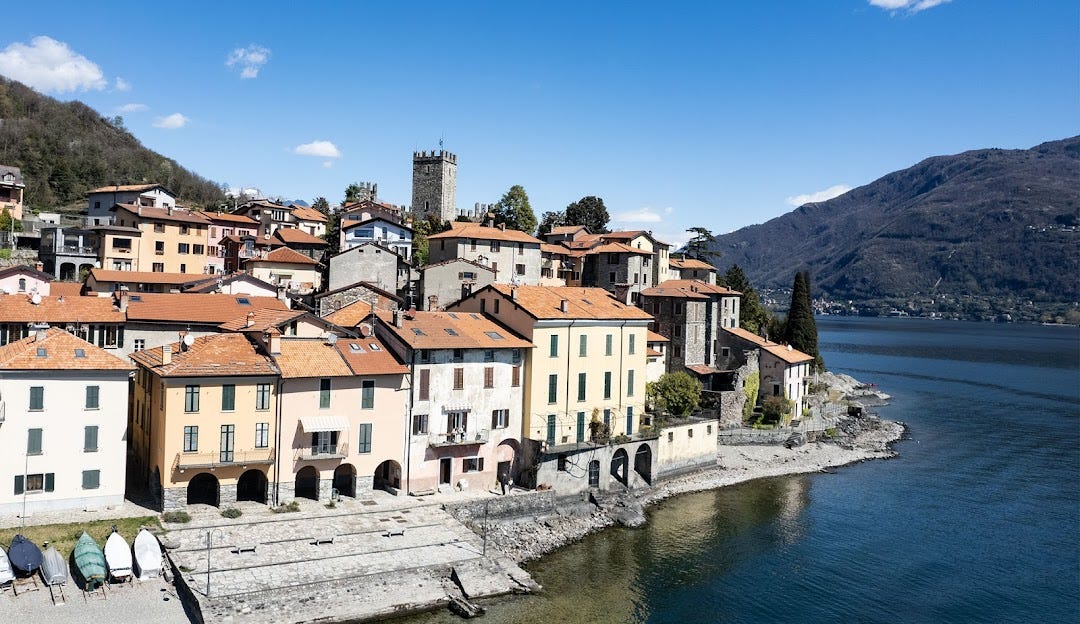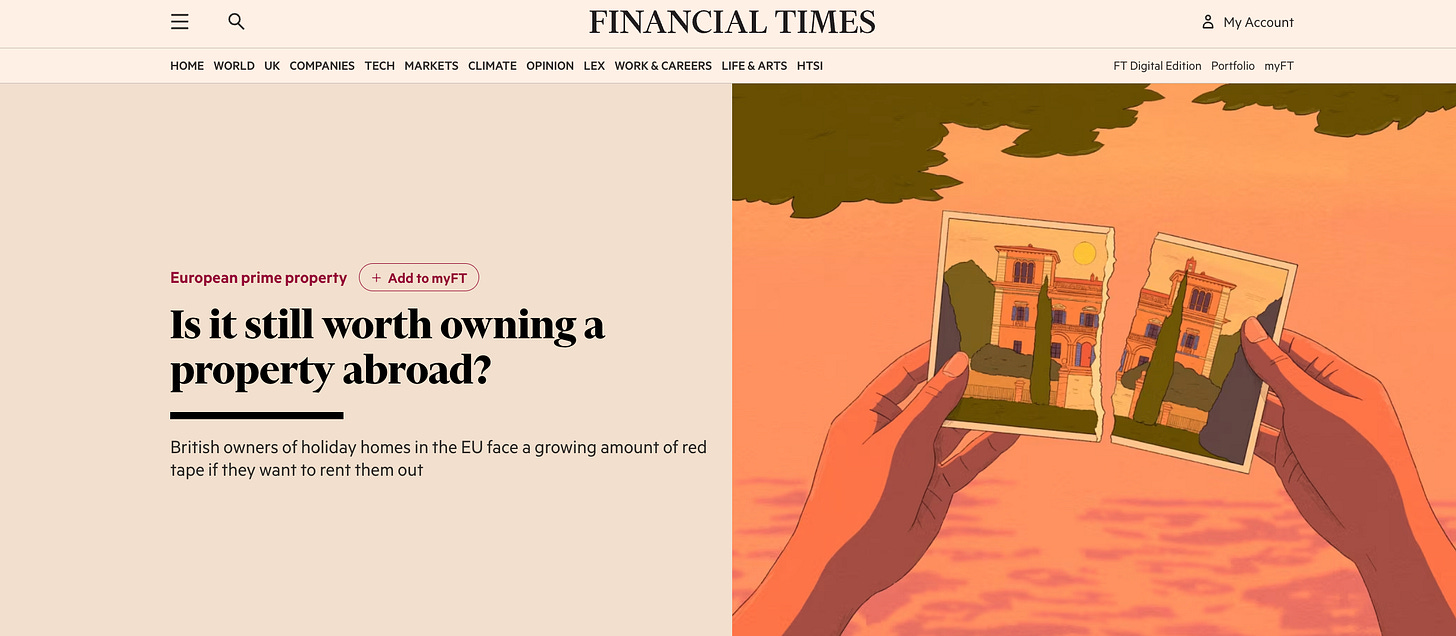Financial Times: "Is It Still Worth Owning a Home Abroad?"
Yes — but only if you’re not trying to escape reality, but to build a better one.
There’s a certain tone in the FT article — part concern, part nostalgia — that perfectly captures a very British disappointment: the idea that the Mediterranean dream is slipping away.
What used to be a carefree escape has become a bureaucratic maze. What used to be a glass of rosé on the terrace now comes with registration codes, fines, and tourist bans.
So, is it still worth owning a house in Europe?
As someone who’s spent the last few years helping people navigate this decision, my answer is: yes — but maybe not in the way you imagined.
1. The dream has changed. And that’s a good thing.
If your dream was to "fly under the radar" — rent your place to tourists while dodging taxes and forms — then no, that era is over. Europe is regulating. Locals are angry. The loophole lifestyle is closing.
But maybe that dream was a little shallow to begin with. If you want a house abroad today, it helps to think of it less as a revenue stream and more as a real life choice.
2. Owning isn’t about escaping, it’s about anchoring
The people I see succeeding with their foreign homes today aren’t “investors.” They’re re-rooters. Remote workers, young families, early retirees. People who choose a second country like others choose a second career. Not to check out, but to re-engage — with food, community, space, nature.
3. Yes, there are rules. And they’re not unfair.
Is it annoying to get a tourist license or file tax returns abroad? Sure. But so is driving in London or renovating a flat in Hackney. Europe isn’t rejecting owners — it’s asking for more responsibility, more visibility, more respect.
In return, you get lower cost of living, generous inheritance rules, often better healthcare, and something that’s hard to quantify but easy to feel: presence.
4. Not all destinations are the same
The FT focuses on hotspots like Barcelona or Lisbon. But Europe is vast. Not every village has banned key boxes or capped rental nights. There are hundreds of towns — especially in Italy, inland Spain, rural France — that want new residents. Places where your presence matters.
5. The new dream is quieter. But more durable.
It’s not a postcard anymore. It’s a bet on long-term quality of life. Maybe even identity. And no, you don’t have to become an Airbnb host to make it work.
If anything, this is the time to decouple ownership from exploitation — and reconnect it with meaning.
So yes. It’s still worth owning a home abroad.
But less as a statement of escape, and more as an act of commitment.
And no — we don’t need more British pubs on the Amalfi Coast.
Italy is beautifully uncolonisable. And that’s part of its value.
Financial Times: “Ha ancora senso comprare casa all’estero?”
Sì — ma solo se non cerchi una via di fuga, ma un nuovo inizio.
C’è un tono, nell’articolo del Financial Times — tra il nostalgico e il disilluso — che racconta bene una certa frustrazione molto britannica: l’idea che il sogno mediterraneo stia svanendo.
Quello che era una fuga spensierata è diventato un labirinto di burocrazia. Quello che era un bicchiere di rosé al tramonto oggi arriva con codici di registrazione, multe e divieti.
Quindi: ha ancora senso comprare casa in Europa?
Per esperienza diretta, la mia risposta è: sì — ma non come pensavi.
1. Il sogno è cambiato. Ed è anche meglio così.
Se il sogno era “fare i furbi” — affittare su Airbnb senza dichiarare nulla — allora no, quel tempo è finito. L’Europa regola, i cittadini protestano, le scappatoie si chiudono.
Ma forse era un sogno un po’ superficiale. Oggi, comprare casa all’estero non è più una rendita passiva, ma una scelta di vita attiva.
2. Non si scappa: ci si radica
Chi riesce davvero oggi con una casa all’estero non è un investitore. È qualcuno che decide di rimettere radici. Nomadi digitali, pensionati, famiglie, italiani di ritorno. Gente che sceglie un altro Paese come si sceglie una nuova fase della vita. Non per staccare, ma per ricominciare.
3. Sì, ci sono regole. Ma sono ragionevoli.
Registrare una casa? Pagare le tasse? Certo che seccano. Ma lo stesso vale per guidare a Londra o ristrutturare a Milano. L’Europa non sta respingendo nessuno — sta solo chiedendo un po’ più di responsabilità e rispetto.
In cambio? Costo della vita più basso, regole di successione più favorevoli, servizi spesso migliori. E una cosa intangibile ma preziosa: presenza.
4. Non tutte le destinazioni sono uguali
Il FT parla di Barcellona e Lisbona. Ma l’Europa è vasta. Non tutti i paesi mettono limiti agli affitti o vietano le cassette delle chiavi. Ci sono centinaia di borghi — soprattutto in Italia, Spagna interna, Francia rurale — che vogliono nuovi abitanti.
5. Il nuovo sogno è più silenzioso. Ma più vero.
Non è più da cartolina. È una scommessa sulla qualità della vita. Sull’identità. E no, non serve fare i padroni di casa su Airbnb per far quadrare i conti.
Anzi: è il momento giusto per scollegare l’idea di possesso da quella di sfruttamento.
Quindi sì: ha ancora senso comprare casa all’estero.
Ma non per scappare — per restare.
E no, non servono più pub inglesi in Costiera Amalfitana.
L’Italia è felicemente non colonizzabile. E proprio per questo vale ancora la pena viverci.



